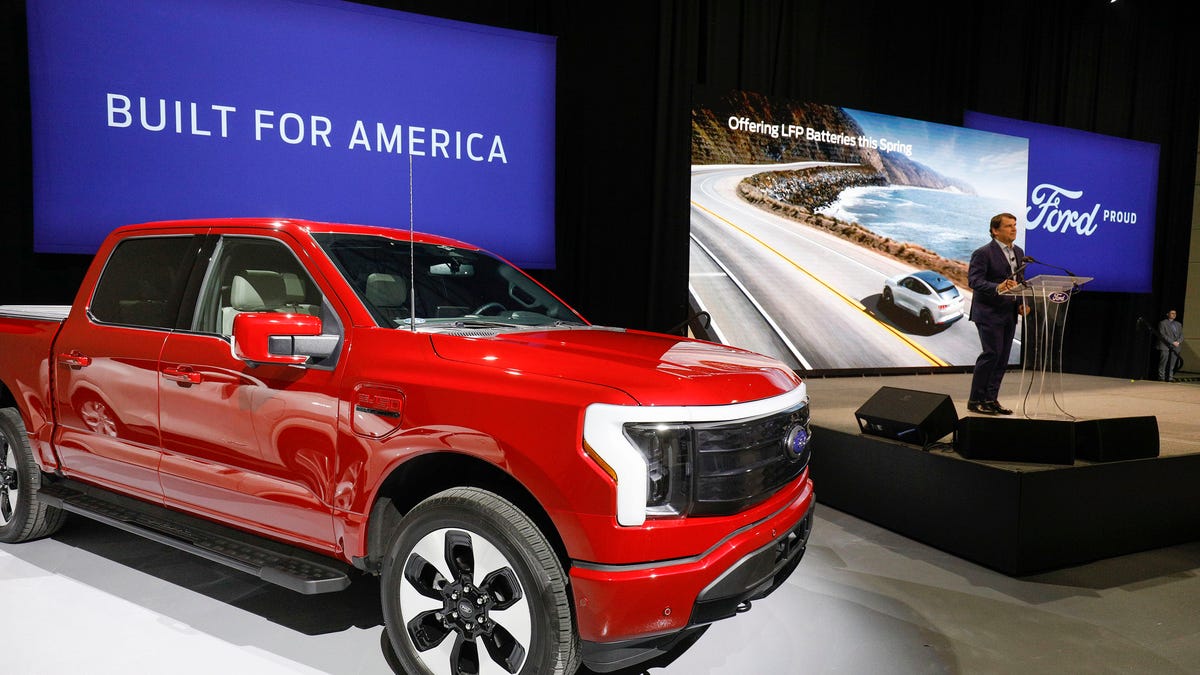Ford plans to hire Chinese military software supplier for EV factory in US: GOP investigators
Ford Motor Company is planning to contract technology and software from at least four Chinese firms that supply similar services to the Chinese government and military, and the North Korean government, according to contracts obtained by Republican investigators.
The revelations — which were released Monday by Rep. Mike Gallagher, R-Wis., the chair of the House Select Committee on the Chinese Communist Party, and Energy and Commerce Chair Cathy McMorris Rodgers, R-Wash. — are part of the GOP’s ongoing joint investigation into Ford’s partnership with Fujian, China-based electric vehicle (EV) battery maker Contemporary Amperex Technology (CATL).
According to the Republican leaders, they recently reviewed portions of Ford’s signed agreements with CATL. Those documents revealed the four Chinese firms in question “will be intimately involved” in the design, construction, and information technology processes for a proposed EV battery factory Ford is building in Marshall, Michigan, with services provided by CATL.
“It is indefensible for Ford to use the same cloud integration and data provider that is linked to North Korean Ministry of Foreign Affairs sanctions evasion activity,” Gallagher and McMorris Rodgers wrote to Treasury Secretary Janet Yellen last week.
BEIJING-BACKED GREEN ENERGY FIRM IS EXPANDING IN US, POSING SERIOUS NATIONAL SECURITY RISK: REPORT
“Before the Ford plant even comes online, its entire security system could be compromised by this software,” they continued. “The same company that is actively supporting the PRC’s surveillance state will have the capability to embed backdoors, spyware, and other forms of malware within Ford’s [cloud service] infrastructure, compromising the confidentiality and integrity of Ford’s sensitive information and posing risk to American’s data privacy rights.”
The lawmakers penned the letter to Yellen after reviewing the signed agreements between Ford and CATL. They requested that the Department of the Treasury’s Office of Foreign Assets Control investigate possible sanctions evasion activity conducted by the four firms which remain unidentified.
US MILITARY BASE’S GREEN ENERGY PROJECT WITH CCP TIES DISCONNECTED OVER NATIONAL SECURITY CONCERNS
Gallagher and McMorris Rodgers sent a separate letter to Commerce Secretary Gina Raimondo, asking her agency’s Bureau of Industry and Security to investigate the four unnamed software service providers. They specifically asked the agency to consider placing the companies on a list of entities subject to significant U.S. trade restrictions.
“To summarize, a cursory review of publicly available information uncovered the above mentioned companies’ direct ties to the [People’s Liberation Army], the CCP, China’s Ministry of Public Security, the ongoing genocide of Uyghur Muslims in Xinjiang, and the North Korean government,” they wrote to Raimondo.
And, in a third letter, the Republicans asked Ford President and CEO James Farley to make a relevant company official available for an interview with their committees.

“We’ve been helping the committees understand this Ford wholly owned and operated project,” a Ford spokesperson told Fox News Digital. “Ford has always been and remains fully committed to following all government regulations across our business.”
“Beyond legal requirements, Ford suppliers are required to meet our high standards and codes of conducts, including those to protect human rights, and are obligated to extend those requirements to suppliers with whom they might work,” the spokesperson said. “We welcome any information from any source concerning the integrity of our supply chains and partners.”
CCP-TIED ELECTRIC VEHICLE COMPANY AWARDED MORE THAN $500 MILLION IN TAXPAYER MONEY FOR SECOND US PLANT
In their letters, the Republicans stated the first of the four Chinese companies in question is contracted to develop the concept design on behalf of CATL at Ford’s Michigan plant. That same firm is a supplier of engineering design services for the Chinese military.
A second company will be providing the proposed plant’s Integration Platform as a Service tools and applications, which play a key role in IT infrastructure. That company provides similar services to entities affiliated with sanctions evasion activity and the North Korean government, the Republican leaders wrote.

A third Chinese company will be hired to provide Ford with its Unified Authentication Account software tools, which are designed to safeguard online user access, at the plant. That firm currently supplies software services to the Shenyang Institute of Automation, a subordinate institute controlled by the Chinese Academy of Sciences which is already listed by the Department of Commerce, the Republican investigators found.
JOE MANCHIN GOES SCORCHED-EARTH ON BIDEN ADMIN OVER EV ACTIONS BOOSTING CHINA
And the fourth company will oversee Ford’s so-called Business Process Management software tool. The company, though, has contracts with China’s Ministry of Public Security’s Xinjiang Uyghur Autonomous Region Public Security Department, which the Republicans noted is sanctioned by the Treasury Department over its “ongoing facilitation of the genocide of Uyghur Muslims.”
In February 2023, Ford announced it would invest $3.5 billion to build a lithium iron phosphate battery plant — to supply its growing electric vehicle manufacturing — in Marshall, creating 2,500 new jobs. As part of the announcement, the U.S. automaker said it had reached an agreement with CATL to manufacture the battery cells at the plant using services provided by the Chinese company.

The plan received widespread pushback from national security experts and lawmakers over CATL’s extensive ties to the CCP, though Ford has downplayed the criticism and repeatedly said it maintains sole ownership of the plant.
Then, in November, Ford announced that it would dramatically downsize the plant by 40% and lowered the expected number of jobs it is projected to create by more than 30%.
“We are concerned that Ford’s partnership with a Chinese company could aid China’s efforts to expand its control over United States electric vehicle supply chains and jeopardize national security by furthering dependence on China,” a group of House Republicans led by Energy and Commerce Chair Cathy McMorris Rodgers wrote to Farley in September.
“Should China gain control of domestic electric vehicle production, the United States would be exposed to serious national security risks at a time of escalating geopolitical tensions.”
Read the full article Here


